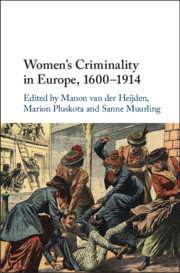CUP is publishing an edited
collection on women’s criminality in Europe.
ABOUT THE BOOK
Bringing together the most
current research on the relationship between crime and gender in the West
between 1600 and 1914, this authoritative volume places female criminality
within its everyday context. It reveals how their socio-economic and cultural
contexts provided women with 'agency' against a range of European backdrops,
despite a fundamentally patriarchal criminal justice system, and includes
in-depth analysis of original sources to show how changing living standards,
employment, schooling and welfare arrangements had a direct impact on the
quality of life of working class women, their risk of becoming involved in
crime, and the likelihood of being prosecuted for it. Rather than treating
women's criminality as always exceptional, this study draws out the
similarities between female and male criminality, demonstrating how an
understanding of specific cultural and socio-economic contexts is essential to
explain female criminality, both why their criminal patterns changed, and how
their crimes were represented by contemporaries.
ABOUT THE EDITORS
Manon van der Heijden, Universiteit Leiden
Manon van der Heijden is
Professor of Comparative Urban History at Universiteit Leiden. Her research
interests include crime and justice, marriage and the family, urban finances
and public services. In 2012, she was granted a NWO VICI project Crime and
Gender 1600–1900. She is a member of the Academia Europaea and author of Women
and Crime in Early Modern Holland (2016).
Marion Pluskota, Universiteit
Leiden
Marion Pluskota is Assistant
Professor in Social History at Universiteit Leiden. She has published
extensively on prostitution and criminality in the eighteenth and nineteenth
centuries. She is the author of Prostitution and Social Control in
Eighteenth-Century Port (2015).
Sanne Muurling, Universiteit
Leiden
Sanne Muurling recently completed
her Ph.D. at Universiteit Leiden with a dissertation on everyday crime and
gender in early modern Bologna, Italy. Her research focuses on the social
history of everyday life, including crime and deviance, single motherhood,
welfare institutions, poverty and living culture.
TABLE OF CONTENTS
1. Introduction: women and crime
in history Sanne Muurling, Marion Pluskota and Manon van der Heijden
2. Explaining crime and gender in
Europe between 1600 and 1900 Manon van der Heijden
Part I. Violence, Space and
Gender:
3. Women, violence and the uses
of justice before the Criminal Court of early modern Bologna Sanne Muurling
4. The 'vanishing' female
perpetrator of common assault Jo Turner
Part II. Prosecution and
Punishment:
5. Gender and the prosecution of
adultery in Geneva, 1550–1700 Sara Beam
6. 'Find the lady': tracing and
describing the incarcerated female population of London in 1881 Lucy Williams
and Barry Godfrey
7. Gender and release from
imprisonment: convict licensing systems in mid- to late-nineteenth-century
England Helen Johnston and David J. Cox
8. Female and male prisoners in
Queensland 1880–1899: re-entry, risk factors, recidivism Alana Piper, Catrien
Bijleveld, Susan Dennison and Jonathan de Bruin
Part III. Representation of
Crime:
9. Girls, young women and crime:
perceptions, realities and responses in a long-term perspective Sarah Auspert,
Margo de Koster and Veerle Massin
10. 'Monstrous and indefensible'?
Newspaper accounts of sexual assaults on children in nineteenth-century England
and Wales Daniel J. R. Grey
11. Gender and Dutch newspaper
reports of intimate violence, 1880–1910 Clare Wilkinson.
More info here


No comments:
Post a Comment
Note: Only a member of this blog may post a comment.